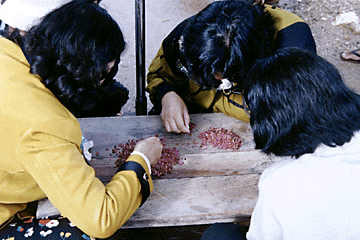


Myanmar counts
By David Wong
riches beyond rubiesI have traveled with students to Southeast Asia, through Honolulu Community College's summer study abroad program for four years. Last year, I embarked on the most ambitious tour to Mongkok in Myanmar, an area controlled by the Myanmar military and off limits to all but a few elite visitors.
It is forbidden for an obvious reason. Mongkok is rich with rubies. One can just pick them up off the ground. We have seen women squatting around village streams picking and adding rough gems to the handful of rubies they hold.
We needed special permission from the Myanmar government and the military command to make the eight-hour trip by bus to Mongkok. A military agent was assigned to accompany us, and we were informed it was for our protection.
We hiked to a village to watch young students sing for us in their native language. We joined them in singing the universal tune, "Jingle Bells."
One of our faculty members, professor Cynthia Smith, captivated the children with her long sandy-blond hair, seldom seen in this country. One little boy of about 5 years of age, chased after Smith and gave her a small bag of rubies. He did not ask for anything in return, but for simple acknowledgement from a friend from afar.
I have often been told that Myanmar is a Third World country. And I am reminded constantly by the United States Embassy and my fellow colleagues that it is a military controlled country. I have also been asked whether evidence of poverty in the streets depresses me.
My answer to this question has always been no, because I find the people of Myanmar to be dignified, proud and happy, almost defiantly so. No matter how difficult their life situation, they always remember to smile and always seem to make do with what they have.
Walking through any of the villages at dawn, I saw families out on their humble porches, yakking away. And when the children spot foreigners, they will trail them, sometimes practicing their English.
I remember seeing, on a rainy day, dozens of children playing with a half-inflated ball, kicking, laughing and skidding on the mud. Suddenly, one of the boys fell on the ball and it blew up. Holding the remains of the ball, at first with sadness, the children proceeded to move on to their next game, jumping into the swift current of a nearby river, swimming in the muddy water, once again with delight.
I had with me a few balloons. I blew one up and handed it to the kids. I have never witnessed as much joy as I saw coming from a simple balloon, as the children tried to snatch it from one another in the muddy river.
The same day that Smith received her gift of rubies, I saw something that will forever be etched in my memory. An old woman was wrapped in a longyi (sarong), her breasts -- to borrow a phrase from Arundhati Roy -- like weighted socks, half exposed. She had made her way down the steep banks of a canal, holding a bright red plastic scoop.
She squatted on its bank and proceeded to scoop the brown liquid over her head. I realized she was performing her daily ablutions. She brought no soap with her, but she rubbed her face, her arms, in cleansing motions as though the water was from the purest stream.
Are these people really poor and oppressed? Such a perception as portrayed by our press is indeed morally compelling, but only in abstraction. Could it be that we in the West have selected perception? I remember too well the following quote from "Zen and the Art of Motorcycle Maintenance":
"We are both looking at the same thing, seeing the same thing, talking the same thing, thinking about the same thing, except he was looking, seeing, talking and thinking from a completely different dimension ... What we have here is a conflict of visions of reality."
I am going back this summer to "Ruby Land," perhaps this time to do my "ruby shuffle," a phrase coined by my students as they looked down on the ground at Myanmar and walked, with eyes focused on the ground, their spirits soaring.
David Wong is an assistant professor in the
Honolulu Community College Asian Studies Department.
Journeys is an occasional Star-Bulletin feature
to reflect voices of the community beyond our
shores, making connections that resonate here.
Speak up by fax at 523-8509; by answering machine at 808-525-8666;
snail mail at P.O. Box 3080, Honolulu 96802;
or e-mail, features@starbulletin.com